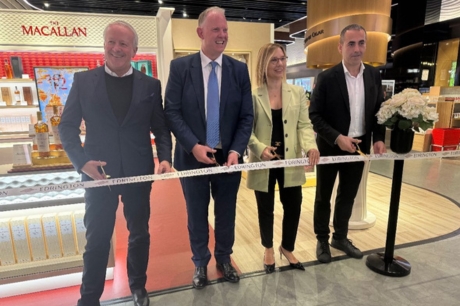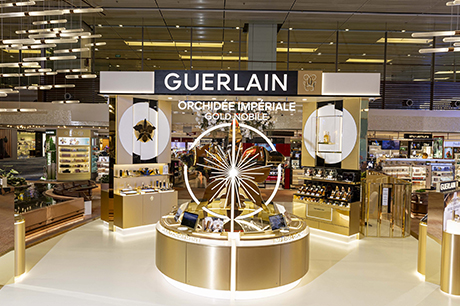Heinemann ready to look at Asian markets
By Administrator |
At last week?s China Airport Retail Summit 2007 in Beijing, Christoph Neusser, Member of the Board of Gebr. Heinemann made a clear declaration that the company is now ready to realise its ambitions to enter
Chinese and Asian markets. He talked exclusively to TREND on this and other important issues to Malin Eriksson in Beijing.
In an exclusive and detailed interview with TREND, Neusser – who first arrived in Asia in 1985 when he worked for Holland?s Philips Electronics – said: ?The Asian market then and now is still challenging, almost frightening. But we all know that Asia is the place to be in order to secure your market position and growth.
?If you ask me, I will never leave Gebr. Heinemann. I very much like the company?s DNA. In every strategic, policy or daily operative decision in the company I have to ask myself: do I personally agree with this based on my own personal, ethical and moral standards? In every case, I can tell you so far there is a total conformity between my own standards and that of the company?.
That Neusser now works for one of the industry?s giants is unquestioned. Gebr. Heinemann currently operates as a retailer/retailer/supplier at 46 international airports, including 225 Duty Free, Travel Value – and Concept shops frequented by more than 150,000 customers a day.
It has also earned itself an enviable reputation over the past two three decades of never leaving its suppliers or retail partners in a state of despair, no matter what difficulties they face – including external factors such as in those in the Balkans in the early 1990?s.
?Yes, our partners had a really difficult time following the 1991 siege of the Croatian coastal city of Dubrovnik, which lasted nine months and had devastating consequences for the city and the entire region. Today, we are proud to have very successful exclusive supply contracts with the airport retailers in Dubrovnik, Skopje and Zagreb, for instance. I believe our trading partners are very happy with us?.
Despite having the clear ability to squeeze more margins out of its suppliers Neusser adds that this is neither a priority nor an ambition at Gebr. Heinemann, as he explained: ?We need to let our suppliers and trading partners live their lives. We are not interested in levels of margins that would put any supplier in difficulty or their partnership with us in jeopardy. We need them as much as they need us?, says Neusser.
He stresses that this policy is just ?one? of the reasons why suppliers speak so highly about the company. For example, for the majority of the world?s leading confectionery companies, Gebr. Heinemann is by far their biggest customer. As one supplier puts it: ?The services they offer, their ways of explaining and communicating, are very good. They are not using their inbuilt and undisputable power to obtain excessive or ?intimidating? advantages, which is good and indeed appreciated.
?They know themselves very well that times might change one day also for them – for whatever reason – and on that day we will stand firmly behind them for exactly the same reason?.
But while Neusser acknowledges that Heinemann is not really established in Asia yet, he says the company is not far from it: ?We have interests in the airport retail operations in Ulan Bator [sometimes known as Ulaanbaatar-Ed], Mongolia, as well as in Vladivostok, Russia. As you know, Vladivostok is located less than 100 kilometres east of the Chinese border and just across the Sea of Japan from the main Japanese island of Honshu. So now we look a bit south from there and then we are in ??, said Neusser with a smile.
As is well documented, Gebr. Heinemann offers airports and partners several cooperation and contract models including supply contracts – the company currently has with more than 1,000 customers working on this basis; exclusive supply contracts (e.g. with airports at Mauritius, Zagreb and Skopje); concession contracts (e.g. with airports at Copenhagen, Frankfurt and Oslo); as well as joint-venture agreements with airports and retailers (e.g. airports at Budapest and Istanbul). In addition, Gebr. Heinemann also operates retail shops itself in many locations.
?All cooperation and contract models have their pros and cons, to us and our partners?, says Neusser. ?Basically a successful cooperation is based on tailor-made contract models that are reflecting differentiated requirements and expectations of airports.
?From the traditional concession contract model with MAGs [minimum annual guarantees-Ed] that we have with several airports, we hope soon to move on to what we call the ?GH Partnership Concession Contract?. This we do not have yet with any airport. The new and innovative partnership concession contract has many advantages to both parties and is characterized by open-book policy; mutually beneficial terms and conditions; full transparency for the airport as regards investments, price policy, supply conditions including advertising revenues, etc; low financial/general business risk for the landlord – the investments are made and financed exclusively by us; common business plan and, last but not least, including the sharing of over-performance regarding turnover and profit?.
Meanwhile, in his speech at the China Airport Retail Summit in Beijing last week Neusser did not disguise Gebr. Heinemann?s keen interest and ambitions to enter the Chinese as well as other Asian markets.
?Why we go for Asia? It?s a must-be if we want to secure the growth pattern that we have embarked on. Asia is essential for any company who has an ambition to be a global player,? said Neusser.
Having said that, he adds some reservations, however. ?There are at the moment plenty of challenges on hand for Chinese airport authorities. At this moment in time they don?t know enough about consumer behaviour. They have a trading background, not a retail background. I hope this conference will make people think in the right direction.
?Luckily, China is eager to learn. They should look around in the world for examples of excellence in airport retailing. It will take quite some time for any retailer to get a foothold in China because of its complexity. Slowly but surely we will get in, I?m convinced of that?.
Asked about which concession and contract models would be likely and suitable for Asian airports, Neusser answered: ?The partnership model is the preferred model. It behaves like a joint venture, but without being a joint venture. The main problem and danger with a joint venture arrangement is that airport people try to teach retailers how to do retail. For it to work, the rules have to be firmly set from the beginning.
?Anyhow, also in Asia we?ll do it in the Hamburg fashion. The humble way. The healthy way. Step by step. We?ll deploy Heinemann?s proven successful set of values governing the overall cooperation with partners, employees, etc – fairness, straightforwardness, honesty. We?ll do as the Asians do – with a touch of Hamburg?, Neusser explains enthusiastically and convincingly.
In his excellent and well-received speech entitled ?Maximizing Airport Retail Revenue By Choosing The Right Cooperation Model?, Neusser also made a very clear point about his and Gebr. Heinemann?s dislike of the unhealthy trend of overbidding, in Asia and elsewhere.
Without being specific he seemingly referred to the recent concession awards in Singapore and India. ?Yes, we made some calculations and we can?t see how some of the winning bids will make money. Such terms are of no interest to us. We make competitive bids, not aggressive bids?.
Back in Europe, Gebr. Heinemann?s business thrives around its logistics centre built in Hamburg in 2003, one of the most modern in Europe. From this centre Gebr Heinemann regularly supplies more than 1,000 customers at airports, seaports and border crossings. The centre is capable of handling 5,000 orders per day involving some 200,000 skus.
Some 400 lorries are loaded each day criss-crossing Europe, Eastern Europe and Central Asia. ?I dare say that our dispatch system in the challenging Eastern European and Central Asian market is second to none?, says Neusser. ?Should we expand in Asia, in the long-run we would have to set up a logistics centre also in Asia,? he said.
Staying on the subject of Europe, Neusser explains that the company?s Oslo operation is doing exceptionally well. ?Last week we reached a daily sales record in one of the categories?, he said, although he preferred not to be precise about which one. At the same time, it is well known that arrival shopping in Oslo plays an ever-bigger part of that business and in low-strength liquor especially.
He says the company is also pleased with its Copenhagen Airport concession: ?In Denmark it has taken us about six months to settle in well in Copenhagen, but now we are starting to get the organisation, the assortments, the overall operation in place?, he states.
This year, Gebr. Heinemann?s business will generate a turnover of about ?1.5bn ($2.2bn). Gebr. Heinemann?s buying power is substantial as the following numbers unveil (numbers refer to category suppliers? sales to Gebr. Heinemann at MSP ? including some estimates):
Fragrances & Cosmetics: ?570m
Liquors: ?255m
Other goods (fashion, electronics, writing instruments, etc): ?240m
Tobacco: ?225m
Confectionery & Fine Food: ?210m
Sales of beauty products remain on a steady upward trend and are expected to represent more than half of the business in 5-10 years. Confectionery is also doing well, gaining market share and so is the very wide category of ?other goods?, including license shops (e.g. Hugo Boss, Burberry, Bulgari, Caviar House, Esprit, Salvatore Ferragamo, Herm?s, Montblanc and Strenesse). Tobacco is losing in importance, and so is liquor – except the low-alcohol sub-categories destined for intra-EU sales.
Gebr. Heinemann was founded in 1879 and as most readers know it is a ?private? company with no obligation to provide official accounts or numbers about its business.
It currently employs more than 2,000 people today and is run by the fourth generation of the Heinemann family represented by the well-known executives, Claus and Gunnar Heinemann. Both share their management duties with Kay Spanger and Raoul Spanger. As many will recall, the company was led by the legendary, popular and immensely respected Harry Diehl for many years and he remains an ambassador for the company to this day.
To its credit, the company has also become more transparent in recent years and it has even simplified its name, having historically insisted that it should always be referred to as ?Gebr. Heinemann? (translated as the ?Heinemann Brothers?). ?I can inform you?, says Neusser, ?that following a recent board meeting you may now – after 128 years – refer to us as ?Heinemann? without risking to offend any one of us?.
Heinemann now holds an unchallenged number one position in Europe, accounting for a staggering 10% or near percentage of the global duty free and travel retail business in 2007 (estimated to land at $33bn for the full year 2007). Heinemann?s recent decision to be transparent on this very important issue is also welcomed by all parties.
This estimated turnover includes distribution, logistics and IT services, marketing support, wholesale supply, export, re-export, license shops as well as retail activities – such as at Munich Airport – of E.1.5bn ($2.2bn) in 2007, equalling retail sales worth about 50% above that.
YNGVE BIA, PRESIDENT OF THE SWEDISH RESEARCH ANALYST GENERATION GROUP, COMMENTS:
?This interview, this news and these figures are appreciated indeed, since it is important to place and correctly rank a private company such as Heinemann in the context of all the other publicly listed retailer companies in our industry and in the world.
?This clearly puts Heinemann firmly among the Top 3 retailers in the world. I wish – and many suppliers and traders with me – that Heinemann also soon decides to join our TRAQ audit system helping all trading parties to better understand their position in the market including market shares, evolution of sales and so on.
?But we are still hopeful that there will be a positive decision from Heinemann soon to join the TRAQ audit programme – alongside most of the world?s other major retailers that are already onboard. When that happens, the complex world of duty free and travel retail will become much more transparent, tangible and accessible to all traders and to the ultimate benefit of us all?.
TR Consumer Forum: Agenda & speakers revealed
Influential speakers will unpack the most effective strategies for understanding and engaging...
OUT NOW: March/April Leading Americas Operators
The TRBusiness March/April 2024 edition boasting the inimitable leading Americas Operators...
Saudia Arabia's KKIA unfurls T3 duty free expansion
King Khalid International Airport (KKIA) has unveiled the first stage of its much-vaunted duty...
-
 International,
International,TR Consumer Forum: Agenda & speakers revealed
-
 International,
International,OUT NOW: March/April Leading Americas Operators
-
 International,
International,Saudia Arabia's KKIA unfurls T3 duty free expansion

In the Magazine
TRBusiness Magazine is free to access. Read the latest issue now.

 Trbusiness. The travel retail Trbusiness. The magazine for global retail and duty free professionals.
Trbusiness. The travel retail Trbusiness. The magazine for global retail and duty free professionals.





















